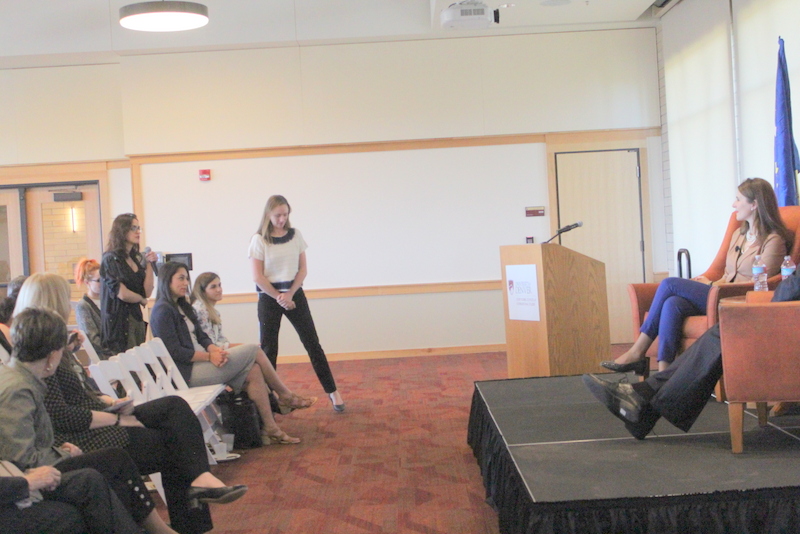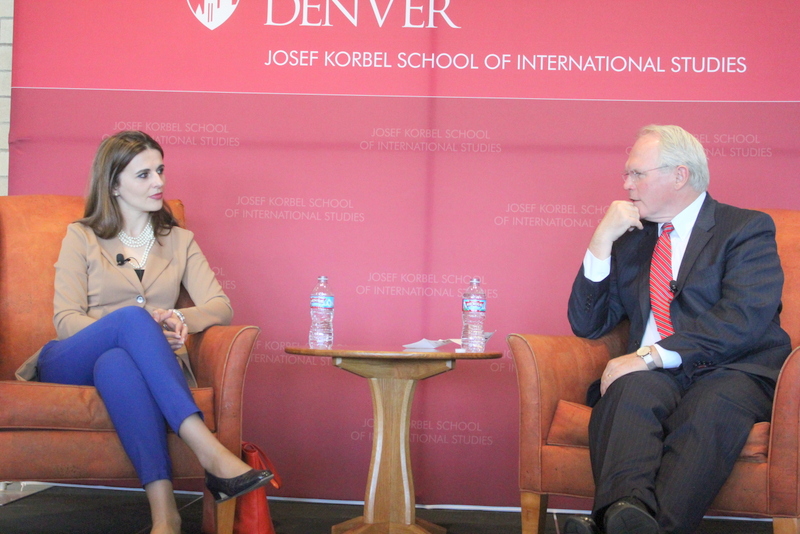
Blerta Avdili (left standing) questions Ambassador of the Republic of Kosovo to the US about human rights in Kosovo and her role in them.
On Wednesday Ambassador Vlora Çitaku, the Ambassador of the Republic of Kosovo to the United States, was met by a local who took exception to the invitation of Çitaku by the University of Denver, and ended her protest of the event and of Çitaku’s comments by throwing rotten eggs at her.
Dean Christopher Hill has drawn criticism in the past for his choices of guests to bring to the school. In 2013, an event organized by the school to award President George W. Bush a Global Service Award drew protest by the school’s students, alumni, and faculty for Bush’s support of the Iraq War and for torture. In 2015 Hill drew further criticism for his choice of speakers, former president of Peru Alejandro Toledo, who is currently evading an arrest warrant in his home country for corruption and money laundering. Toledo is in hiding in the US despite extradition requests by Peru.
Çitaku engaged with Dean of the Josef Korbel School of International Studies at the University of Denver in a public dialogue about developments in the decade since Kosovo declared its independence, current challenges and the rise of Russian influence in the region. The event was organized by Sié Center and Denver Women in International Security.
Denverite Blerta Avdili, a refugee from Kosovo, challenged Çitaku about the discussion, especially concerning the 2016 death of jailed activist Astrit Dehari whom Advili believes was murdered. She’s not alone in this theory, especially after his cellmate was found dead in jail shortly after.
Avdili began her question to Çitaku referencing the death, “A bottle was shoved down his throat. He was put into prison on false accusations of terrorism by the party that you previously belonged to and is now being considered a suicide. So what are the steps you as an ambassador, what are the steps [that] must be taken?”
The following video captures what happened next:
Dehari, a 26 year-old medical student and member of the opposition political party Vetevendosje was found dead in his cell on November 5, 2016. His activism involved education reform and he had been accused of terrorism when an explosive was thrown into parliament in August of 2016. Two years earlier his brother, also a member of the Vetevendosje opposition political party was also alleged to have committed suicide.
Following the death of Dehari, thousands marched in the streets of Pristina, the capital, to protest what they said was a suspicious death and that they wanted the incident to be investigated by an international independent investigation. Protesters also called for the dismissal of the Ministers of Justice and the Interior.
An autopsy report on the death of Astrit Dehari listed the cause of death as “asphyxia – respiratory failure due to the closure of upper respiratory pathways by strong tool.” adding that the forensic department officials issued a statement of suicide. Two weeks later, inspectors from the Ministry of Justice suspended officials of the Prizren prison, and three other officers of the prison.
Attempts to invoke outside entities to contribute to an investigation failed. British Ambassador Ruari O’Connell declined to offer London’s Metropolitan Police for an investigation. O’Connell wrote to Kosovo Justice Minister Dhurata Hoxha, “Given that there is no direct British link in this case, it would not be appropriate for British police to be involved.” But O’Connell did add “This case demonstrates the need to make urgent reforms to the rule of law in Kosovo, so as to restore public trust in the system.”
In response to the request by Hoxha for outside help, Dehari’s family called the move an admission of state responsibility unable to conduct a proper investigation on its own
The Nation Report caught up to Avdili following the incident for clarity about her motivations to confront Çitaku and what led her to throw eggs at her. She said that she wrote “Stop Pinkwashing in Kosova” on the eggs. Avdili compared Kosova to Israel in relation to LGBTQ rights, “They give LGBT rights and they promote the country with that, but at the same time, they don’t [give rights]. And they hurt people in other ways, especially the Palestinian population. If you were to listen to only the Ambassador or the government in power, one would think that Kosova is this beautiful place where women have all these beautiful rights. But that’s not the truth.” Avdili remembered back to when the female president Atifete Jahjaga came to power, “She was elected by the US Embassy. Out of nowhere, we heard that we had a new president.”
“We need policies and we need people that recognize every form of structural violence. Women in Kosova don’t need public figures like Vlora Çitaku, or [former president] Atifete Jahjaga, or the journalist who just joined PDK Arbana Xharra or the numerous many women that their gender identity is being used for imperialist politics.
We need hospitals. We need public healthcare. We need institutions that will protect us from the gender-based crimes done in Kosovo every day.
Here we have this mentality if a country has women in power, if a country does this, then they are going in the right direction. That doesn’t mean anything. Her party where Vlora Çitaku comes from, the PDK party, they have invented some of the worst crimes against women especially when you look at healthcare, education, especially when it comes to women in rural areas.
That’s what irritates me. [Çitaku] what are you talking about? You’re using the collective women of Kosova for yourself to get into power.”
Avdili questions the opportunities for Kosovars if the country were to join the European Union. She said that given that Kosovo is not at a point of competing with Germany or other EU countries that the role of Kosovars would be relegated to subservient jobs that would be vulnerable to trafficking, “What does that mean for the typical Albanian? What does that mean for the typical Kosovar? That means that they are going to be doing jobs that are basically cleaning, getting into sex trafficking. We have seen and we have witnessed what happens to countries like Romania. So what will your role in the EU be?”
Kosovo declared independence from Serbia in 2008. The Nation Report is running a series about events since the declaration.
Belgrade has refused to recognize Kosovo as well as Cyprus, Greece, Romania, Slovakia, and Spain.
The program was sponsored in part by the Inclusive Global Leadership Initiative at the Sié Center, which initiates research, education, and programming centered on the role of women and other underrepresented groups in movements related to the advancement of peace and security across the world.
